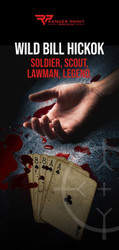Life in the Wild West: Wild Bill Hickok
Posted by Ranger Point Team on Aug 19th 2021
Introduction
It’s rare to find someone who hasn’t heard of Wild Bill Hickok. His life is legendary. His character appears in many movies set in the frontier west.
Wild Bill helped bring order to the frontier West. His gunfighting skills inspired many of our wild west tales and legends as one of our earliest "heroes of the west."
Early Life
Hickok’s family farm in Illinois was one of the stops on the Underground Railroad. He left the farm at the age of 17, ending up in Kansas, where he joined the antislavery Free State Army of Jayhawkers.
Hickok became the bodyguard for Gen. James H. Lanes. During this time, he stopped a man from beating a young boy, who later became one of his closest friends, Buffalo Bill Cody.
Eventually, Hickok took a job as a teamster for the freighting company that formed the Pony Express. While on the job, he came across a bear blocking the road and shot it. But this only angered the bear, and he was practically crushed to death when he killed it with his knife.
After he recovered, he worked at the Pony Express station at Rock Creek in Nebraska. The famous McCanles Massacre took place there in 1861. There were conflicting stories of what really happened, but Nichols’s version of the story that appeared in Harper’s six years later drew the most attention.
The young Hickok became an instant legend. His gunfighting skills became the inspiration for many dime novels of the time. He soon earned the nickname Wild Bill during the Civil War, perhaps for his daring fighting in the Union army, where he served as a spy, scout, and sharpshooter.
Wild Bill continued his adventurous ways, sometimes on the side of the law, sometimes almost against the law. He served as marshal for a few towns in Kansas and eventually tried being a showman until he became bored and returned to frontier life in the west.
Death
In 1876, Wild Bill married a girl from Wyoming and traveled to South Dakota, where he hoped to earn enough money in the goldfields to allow his wife to join him. On August 2, 1876, he was shot and killed while playing poker.
The cards he held—a pair of black aces and a pair of black eights plus an unknown fifth card—became known as the "Dead Man's Hand."
Wild Bill was buried with his prized sporting version of the .50-caliber Springfield Model 1870 rifle at his side. Someone took the rifle during his reburial in 1879. The rifle eventually ended up in the James Earle collection.
Wrapping up
When it’s time to customize your favorite rifle,
visit us for American made firearms parts you can trust.
Frequently Asked Questions
How did Wild Bill Hickok get his nickname?
Bill Hickok got his nickname ‘Duck Bill’ because of his sweeping nose and a protruding upper lip.
What was Wild Bill Hickok's real name?
Wild Bill Hickok’s real name was James Butler Hickok.
What happened to Wild Bill Hickok's guns?
Wild Bill Hickok’s guns were sold at auctions, and some were kept at museums.

